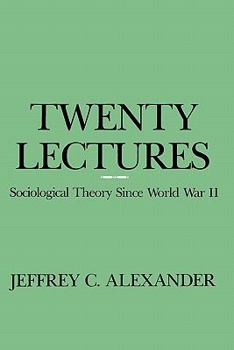Twenty Lectures: Sociological Theory Since World War II
Select Format
Select Condition 
Book Overview
No Synopsis Available.
Format:Paperback
Language:English
ISBN:0231062117
ISBN13:9780231062114
Release Date:October 1987
Publisher:Columbia University Press
Length:393 Pages
Weight:1.24 lbs.
Dimensions:1.0" x 6.0" x 9.0"
Grade Range:Postsecondary and higher
Customer Reviews
1 rating
A good introduction but not comprehensive
Published by Thriftbooks.com User , 22 years ago
This book is a textbook for the class on the contemporary sociological theories, as the subtitle suggests. Jeffrey Alexander is one of the well-known figures in that field. So we could expect some readable and plain presentation of past theories. And so it is. This book has some advantages over other textbooks:1. For example, His reproduction of Parsons is vivid. Most accounts of Parsons have been skewd toward somewhat negative criticism. But in such a way, I don't think we could get anything from him. Alexander sketch out his theory with lively examples and the behind-motive of Parsons. We could figure out a theorist or theory when we grasp the problem which he or she attempts to solve. Alxander manages to elucidate theorists in that way.2. The contemporary theories of sociology gained the impetus with Parsons. So most textbooks open the first chapter with him. But they are weak at clearingly cutting out what has driven subsequent theoretical development of various competiting schools like conflict theory, excahnge theory, ethnomethodology and the like, to rebel against Parsons. But this book has the strong point in that matter.But I have to pinpoint some disadvantages:1. The author devoted almost a third to Parsons. Yep. to capture the trend since '60s in that field, there should be some good grasp of the starting point, Parsons. But subsequnet schools have not much coverage in this book; mear 2 chapters for each school. I think it's for the theoretical orientation of the author: neo-functionalism. But who read Parsons these days? 2. He covers only upto '70s. But now, most classes deal with much more recent theorists like Giddens, Bouridieu, Foucault, Luhman, Rand Collins and the like, and they have much more influence. But the author simply ignored them.






